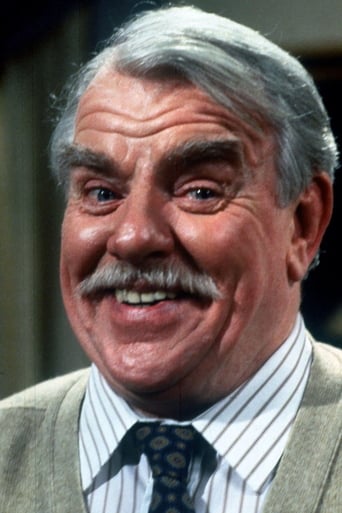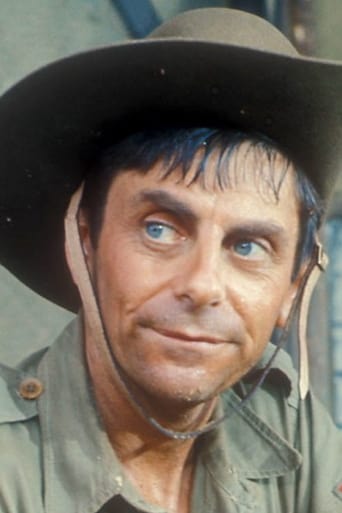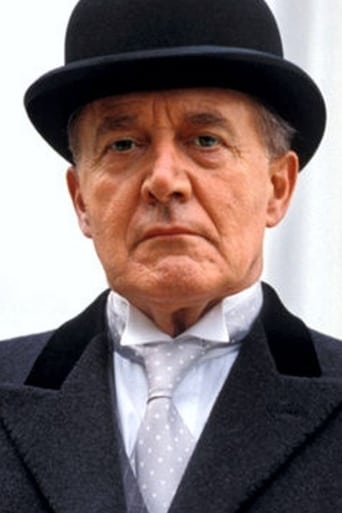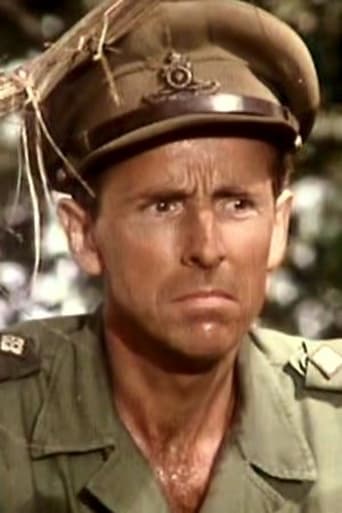Dave
This is a BBC sitcom set in 1945. It's about a Royal Artillery Concert Party. The first four series are set in India; the latter four are set in Burma.This is painfully bad to watch, because all of the members of the concert party are appallingly bad entertainers. After I watched it, I read that the characters are supposed to be awful entertainers - and that's what's meant to be the main source of the show's humour. However, that makes them unpleasant to watch and listen to - and it's just the same bad joke repeated in every episode. It's also unrealistic - if all members of a concert party were bad entertainers, they'd be fired.
Alanjackd
How awful that the BBC refuse to show this again...what a load of nonsense...it was and still is an affectionate look at how things were in the war...I went on holiday to Turkey last year and saw exactly the same thing in the markets...foreign people imitating British for comedy purposes... poor Michael Bates was lambasted as racist for his role but that is exactly the kind of character around at the time...and there still is. This is almost "Spike Milliganesque" in its approach to multi culture comedy...there was never any intent to mock or offend...pure vaudeville. Perry and Croft understood perfectly the comedy in wartime as these were all obviously based on real life characters..anybody who is offended by this should be genuinely ashamed.....this series had 15 million viewers in its heyday...all apparent racists. Must add that all the crew were all in on the fun...Windsor Davies was brilliant., much like Hylda Baker and always using the wrong words ...one thing though....almost every British comedy at the time was made into a movie...why was this left out. Marvelous comedy from the finest writing duo since Galton and Simpson.
ShadeGrenade
I could not believe my eyes when in 2007, fans of 'Celebrity Big Brother' praised it for 'holding a mirror up to real life' ( this was around the time of the racism row involving Shilpa Shetty and the late Jade Goody ) after years of bashing so-called 'racist' '70's sitcoms such as 'Love Thy Neighbour'. I thought they were hypocrites, and said so. 'It Ain't Half Hot Mum' was then thrown into the argument, with some pointing out it had starred a blacked-up English actor. Well, yes, but Michael Bates had lived in India as a boy, and spoke Urdu fluently. The show's detractors ignored the reality he brought to his performance as bearer 'Rangi Ram'. Noted Indian character actor, Renu Setna, said in a 1995 documentary 'Perry & Croft: The Sitcoms' that he was upset when he heard Bates had landed the role, but added: "No Indian actor could have played that role as well as Bates.". Indeed.'Mum' was Perry and Croft's companion show to 'Dad's Army'; also set in wartime, the sedate English town of Walmington-On-Sea had been replaced by the hot, steamy jungles of India, in particularly a place called Deolali, where an army concert party puts on shows for the troops, among them Bombadier Solomons ( George Layton, his first sitcom role since 'Doctor In Charge' ), camp Gunner 'Gloria' Beaumont ( Melvyn Hayes ), diminutive Gunner 'Lofty' Sugden, 'Lah de-dah' Gunner Graham ( John Clegg ), and Gunner Parkins ( the late Christopher Mitchell ). Presiding over this gang of misfits was the bellicose Battery Sergeant-Major Williams ( the brilliant Windsor Davies ), who regarded them all as 'poofs'. His frustration at not being able to lead his men up the jungle to engage the enemy in combat made him bitter and bullying ( though he was nice to Parkins, whom he thought was his illegitimate son! ). Then there was ever-so English Colonel Reynolds ( Donald Hewlett ) and dimwitted Captain Ashwood ( Michael Knowles ). Rangi was like a wise old sage, beginning each show by talking to the camera and closing them by quoting obscure Hindu proverbs. He loved being bearer so much he came to regard himself as practically British. His friends were the tea-making Char Wallah ( the late Dino Shafeek, who went on to 'Mind Your Language' ) and the rope pulling Punka Wallah ( Babar Bhatti ). So real Indians featured in the show - another point its detractors ignore. Shafeek also provided what was described on the credits as 'vocal interruptions' ( similar to the '40's songs used as incidental music on 'Dad's Army' ). Each edition closed with him warbling 'Land Of Hope & Glory' only to be silenced by a 'Shut Up!' from Williams. The excellent opening theme was penned by Jimmy Perry and Derek Taverner.Though never quite equalling 'Dad's Army' in the public's affections, 'Mum' nevertheless was popular enough to run to eight seasons. In 1975, Davies and Estelle topped the charts with a cover version of that old chestnut 'Whispering Grass'. They then recorded an entire album of old chestnuts, entitled ( what else? ) 'Sing Lofty!'.The show hit crisis point three years later when Bates died of cancer. Rather than recast the role of 'Rangi', the writers just let him be quietly forgotten. When George Layton left, the character of 'Gloria' took his place as 'Bombadier', providing yet another source of comedy.The last edition in 1981 saw the soldiers leave India by boat for Blighty, the Char Wallah watching them go with great sadness ( as did viewers ).Repeats have been few and far between ( mainly on U.K. Gold ) all because of its so-called 'dodgy' reputation. This is strange. For one thing, the show was not specifically about racism. If a white man blacked-up is so wrong, why does David Lean's 1984 film 'A Passage to India' still get shown on television? ( it featured Alec Guinness as an Indian, and won two Oscars! ). It was derived from Jimmy Perry's own experiences. Some characters were based on real people ( the Sergeant-Major really did refer to his men as 'poofs' ). I take the view that if you are going to put history on television, get it right. Sanitizing the past, no matter how unsavoury it might seem to modern audiences, is fundamentally dishonest. 'Mum' was both funny and truthful, and viewers saw this. Thank heavens for D.V.D.'s I say. Time to stop this review. As Williams would say: "I'll have no gossiping in this jungle!"
Markhoni
This was the follow up to the immortal 'Dad's Army'and while sharing a wartime setting and comedy based on character had a somewhat harder and cruder edge and was less reliant on whimsy. Perhaps as a result of this, despite the fact that it lasted several series it never gained a real place in the nation's affections to the same extent as Dad's Army. It also straddled a changing period in Britain's attitude to racial stereotyping. The 1970's had begun with the crude 'Love Thy Neighbour' but ended with the first sitcoms featuring more than token black casts (e.g 'The Fosters') and 'It Ain't Half...' was increasingly criticized for its attitude even though as another correspondent says, the Asian characters usually outwit their British 'masters'. Michael Bates as Ranji Ram is probably the last comical asian character to be played by a white actor in makeup a la Peter Sellers. (Bates had lived in India as a boy). Interestingly 'The Simpsons' contains an Indian family whose 'jolly good, sahib' voices and behaviour would be pretty much unacceptable on a British TV programmae today and is very similar to the portrayal of the asian characters in 'It ain't half hot...'. The pint size singer Don Estelle formed an unlikely duo with Sergeant Major Windsor Daies for a few UK hits. Sadly Don is now reduced to busking round Lancashire towns in his 'It Ain't Half...' costume these days.







